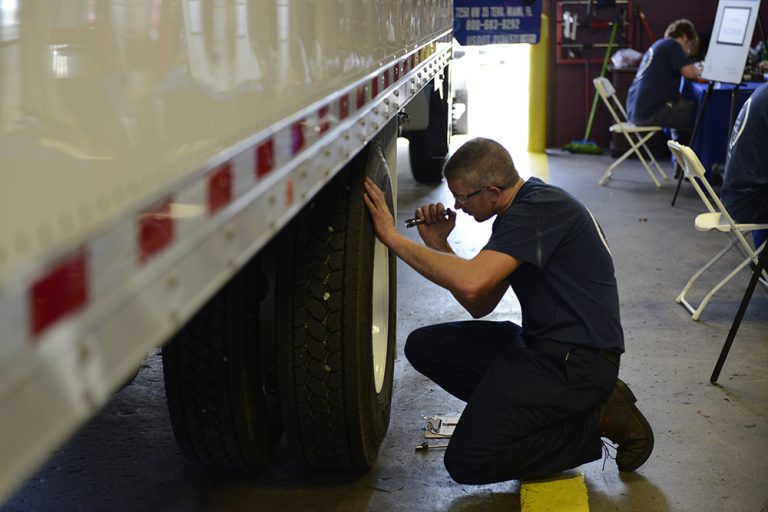
Why Maintenance Matters During Global Turmoil
Some things you are able to control. Others are completely beyond your control and that can be extremely unsettling for people, including those in charge of making sure businesses operate effectively. Just three years after the COVID pandemic struck, who would have envisioned the world once again in such turmoil? War in Ukraine. War in Israel which could impact the entire Middle East. Ongoing inflation. The UAW on strike.
Trucking companies need to closely monitor geopolitical, as well as domestic developments and be prepared to adapt to changing market conditions. Risk management, efficient logistics, and financial planning are key strategies for mitigating any impacts. But what needs to take a front seat for fleet managers is ongoing preventive and predictive maintenance.
The challenges fleets face:
- Fuel prices – Conflict in the Middle East, such as in Israel, often leads to increased oil prices which definitely impacts the operational expenses of trucking fleets and reduces profitability, since diesel is one of the main costs fleets have to deal with.
- Global supply chain disruptions – Conflicts in regions like Ukraine can disrupt supply chains. Delays and disruptions in trade routes affect the availability of goods that need to be transported. This will also impact the scheduling and operations of trucking companies.
- National security concerns – Global insecurity often ends up creating an increase in regulations and security measures, specifically on transportation networks, which could lead to delays, extra paperwork, and added compliance costs.
- Fleet maintenance and safety – This is something that every fleet manager is concerned with every day; but during times such as this, fleets may need to invest in additional safety and security measures. That, in turn, can increase operational expenses.
This doesn’t even start to address the ongoing issues of driver and tech shortages, component and parts shortages, reduced allocation of new trucks, and upcoming regulations that will change what trucks can operate where. What is clear is that fleet managers have a lot to consider. That’s why doing whatever they can to keep the vehicles running safely, effectively, and in compliance is so vital.
How do PMs and predictive maintenance mitigate the potential damage?
The role truck fleets play in times of global turmoil was really clear during COVID, when the U.S. and the world relied on fleets to deliver critically needed supplies, from medical supplies to food to toilet paper. It’s clear that role continues during any time of upheaval. It would be impossible to keep vehicles in optimal shape without robust preventive and predictive maintenance practices.
Preventive maintenance, the scheduled inspection and repair cycles, is intended to keep trucks in top, road-ready condition. Predictive maintenance uses data and technology to forecast when maintenance will be needed, letting fleets prepare for what may come next. The benefits for fleets are clear:
- Reducing downtime – Any vehicle taken off the road negatively impacts the company’s bottom line. But during global upheaval, it’s not just the company that suffers. Times like these lead to increased demands on truck fleets to meet critical needs. By instituting ongoing PMs and predictive maintenance practices, fleets can minimize unexpected breakdowns. Plus, with the difficulties in acquiring new trucks, fleets are able to extend the life of their existing assets through ongoing maintenance.
- Controlling costs – Economic uncertainty prevails today, even without the global conflicts. So, the less spent on costly repairs and parts helps the company better manage its working capital. By working on and fixing small, manageable issues, companies can avoid those costly and time-consuming breakdowns. This is what preventive maintenance does, by identifying and addressing potential issues before they expand into major problems. Predictive maintenance can provide the information necessary to ensure that parts replacements are on-hand to handle any potential issues. Predictive maintenance is invaluable when it comes to extending a truck’s lifespan.
- Ensuring safety and compliance – Safety is top of mind for every fleet, every day – that is especially true during challenging times. On top of that, increasing regulations require that every vehicle be in compliance and that can only be ensured by regularly scheduled preventive maintenance that not only reduces downtime, but also reduces the risk of accidents. Predictive maintenance is extremely useful since it can provide insights into component wear and tear, enabling timely replacements.
- Better decision-making – Predictive maintenance is key to making the best decisions. This does mean that fleets do need to invest in the technology that makes predictive maintenance possible, but that investment will pay for itself in the long run. In times of turmoil, the ability to make data-driven decisions (rather than guesswork) is vital. Fleet managers that can access accurate, real-time information on each vehicle in the fleet can then adapt quickly to changing circumstances.
Obviously, having our fleets running safely, effectively, on time, and in compliance won’t in and of itself change the situations on the ground (from war to strikes to natural disasters to economic volatility). However, the value of knowing that fleets will be ready to deliver what is needed when it is needed can’t be overstated.
About Jane Clark
Jane Clark is Vice President of Member Services for NationaLease. Before joining the full service truck leasing organization, she served in executive positions with some of the nation’s top staffing and recruitment agencies.




